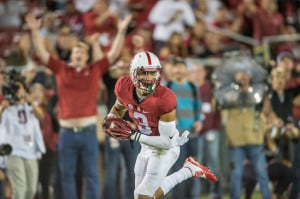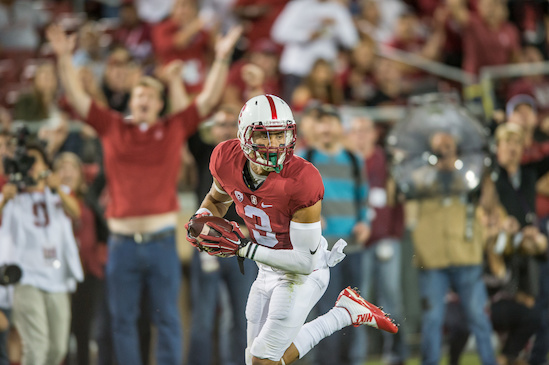Stanford’s play-calling has come under considerable scrutiny in the past few seasons, especially after tough games like the team’s recent trip to Northwestern. While problems seemed less apparent this past week against UCF, in many ways there were plays that the Cardinal aren’t known for running, like a second-quarter flea-flicker, that appeared to be the source of the offense’s breakthrough. Are there any significant problems with Stanford’s offensive scheme, or do any issues lie more with what head coach David Shaw calls its “execution?” We asked Daily Sports writers Andrew Mather, Neel Ramachandran and Do-Hyoung Park to share their thoughts.

Andrew: I don’t mean to say that every play was exactly what it should have been, but I tend to favor the execution explanation. David Shaw’s traditional, conservative offense isn’t perfect, but there really is a lot to like about it. The high chance of positive gains through running on the first plays of a series means even in the worst case, there’s a manageable distance to cover on third down, and it forces opponents into a physical battle for which, more often than not, Stanford is better prepared. A lot of analysts have seemed to question whether Shaw has the talent to run this style effectively, but in many ways its very design is to spread out responsibility amongst different players — it tries to avoid relying on a quarterback to find a receiver on third and long, or putting too much pressure on any one back to break out for big runs.
The problem with the play-calling recently seems to have been that there doesn’t appear to be enough contingency planning in place when problems start to arise. Penalties and continued trouble on the ground have hampered Stanford’s power style, yet adjustments to help the team find its rhythm often seem a long time coming. The Cardinal’s shift to passing to running backs in space just outside the backfield seemed to work brilliantly against UCF, for instance, but it’s not clear why this wasn’t attempted to the same degree in the first quarter of the game or, for that matter, against Northwestern. Therefore, while fixing mistakes should be priority number one for Stanford, it does seem like there’s room for improvement in this respect on all fronts.
Neel: Many who lamented David Shaw’s admittedly ultra-conservative play-calling against Northwestern chose to ignore the staggering number of executional errors Stanford made in its loss. On defense, the secondary dropped multiple passes that could have been intercepted, including what should have been a sure interception by Kodi Whitfield in the endzone. For the most part, however, the defense held up its side of the bargain; it was on the offensive side of the ball where mistakes were made. Michael Rector dropped a pass that would have likely been a touchdown, Christian McCaffrey fumbled and Kevin Hogan threw an ill-advised pick in the waning moments of the game that ultimately put a win out of reach. Hogan & Co. were even worse in terms of offensive efficiency, yielding a dismal 3-of-15 third-down conversion rate. The team also committed a number of boneheaded penalties (three defensive offsides and two offensive substitution infractions), highly uncharacteristic of Stanford football. While there are a few things that need to be fixed in terms of play calling, it was these unforced errors that ultimately made the difference against the Wildcats.
While Shaw’s coaching style can at times be dull, three BCS bowl appearances in his four-year stint have proven it works. Stanford relies heavily on defense and special teams, which have been excellent so far this year. Offensively, the Cardinal’s mindset is that they can beat anyone in the trenches, and thus Shaw chooses to run the ball more often than not on first and second downs. To stop the run, teams resort to run-blitzing and stacking the box heavily. Like Andrew mentioned though, it is in this situation that the offensive play calling seems unable to adapt. Shaw doesn’t call enough play-action and deep pass plays, and when he does, Hogan seems unwilling to look deep, instead looking for the short checkdown pass (his longest pass against Northwestern was 16 yards). The flea-flicker call against UCF forced Hogan to look deep, while also energizing an otherwise stagnant offense and opening up the game for Stanford. Don’t expect to see too much more trickery this year, but Shaw’s willingness to experiment and adapt (at last) is cause for optimism about things to come.
Do: You know, before the start of the season, I would probably have been one of the first to lament Shaw’s play-calling (and, in fact, wrote my first column of the season about Shaw’s inability to adapt) but I’ve come out of two KZSU radio broadcasts a changed man. David Shaw is a calculated risk-taker. He bides his time by prodding the defense all manner of different ways to see how it reacts, and then strikes when he feels the time is right — and not a moment before. And looking at those plays — the deep bomb to Rector against Northwestern and the flea-flicker against UCF come to mind — it certainly seems that when Shaw does take a risk, it usually pays off because of his careful preparation.
It’s often the execution of one part of the offense that does Stanford in, whether it’s a high throw from Hogan, the pocket collapsing, a receiver getting caught up in bump-and-run coverage for a second too long or what have you. Those are things Stanford can’t account for, and honestly, that’s part of the risk that’s assumed by calling such plays. I don’t think that Kevin Hogan is a good enough resurrector of broken plays to keep getting consistent gains even when things don’t go well, meaning that when Stanford misses its opportunity, it usually does so in a big way.
Shaw will take what the defense gives him (he had to pass short against Northwestern because there were two high safeties most of the game and he was able to stretch the field against UCF because the Knights’ secondary was way too aggressive to the line of scrimmage and the middle of the field), and so against a well-coached Justin Wilcox defense on Saturday, expect the high-risk, high-reward plays to be few and far between. Just don’t blame Shaw for that.
Contact Andrew Mather at amather ‘at’ stanford.edu, Neel Ramachandran at neelr ‘at’ stanford.edu and Do-Hyoung Park at dhpark ‘at’ stanford.edu.
